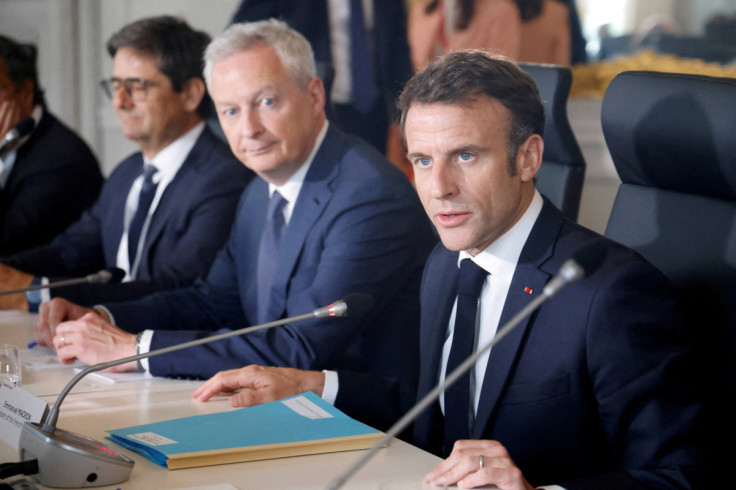Macron Struggles To Kick France's Spending Habit

President Emmanuel Macron has loosened labour laws and cut taxes among other reforms to transform the economy, but has not broken France's addiction to spending big to buy social peace.
Eager to turn the page on months of protests against his plans to raise the retirement age by two years to 64, Macron promised last month to cut taxes on the middle class by 2 billion euros ($2.2 billion).
With France's debt among the highest in Europe at nearly 110% of economic output, his plans met with stern warnings from the public audit office and the central bank that France can ill afford tax cuts without slashing expenses as much.
"We need to make a bigger effort on the public finances, we need to be careful about unfunded tax cuts and letting spending grow too quickly," Bank of France Governor Francois Villeroy de Galhau told a conference on Thursday.
Ratings agencies are taking note too of France's lack of progress in bringing down the national debt, which spiralled during the COVID-19 crisis and now stands just shy of 3 trillion euros.
While the pension reform aims to ease the financial burden, ratings agency Fitch nonetheless downgraded France's public debt at the end of April, saying potential political paralysis and social unrest posed risks to Macron's reform agenda.
Finance Minister Bruno Le Maire has been busy in recent weeks to convince S&P Global not to do the same, when it is due to update its opinion on France late this Friday.
"Contrary to what Fitch said, we are able to carry out reforms, get them passed and applied," Le Maire told France Inter radio on Wednesday, citing the pensions plan and a reform of unemployment insurance late last year.
He said he would detail plans to rein in spending later this month after ordering each ministry to draw cutbacks worth 5% of their budget. On top of that, he asked ministries last week to also freeze 1% of their spending to keep the government's public finances on track.
The risk is that otherwise France will fall behind promises to Paris' European partners to cut the budget deficit from 4.9% of output this year to less than an EU limit of 3% in 2027, which some economists consider already lacks ambition.
"What worries me is that France seems to be the only country that hasn't understood that 3% isn't a target but a limit not to be broken," said Barclays senior economist Philippe Gudin, a former top official at the French treasury.
While French debt is not at risk of falling foul of financial markets, the cost of failing to cut the deficit and debt is quickly growing.
The surge in interest rates of the last year means that the finance ministry now expects the cost of servicing France's debt to rise from 41 billion euros this year to more than 70 billion by 2027, more than what the government spends on education or defence.
"Our policies for the French over the last six years are bearing fruit on growth, jobs and reindustrialisation. We're not doing it for the ratings agencies," Le Maire said.
($1 = 0.9084 euro)
© Copyright Thomson Reuters {{Year}}. All rights reserved.





















